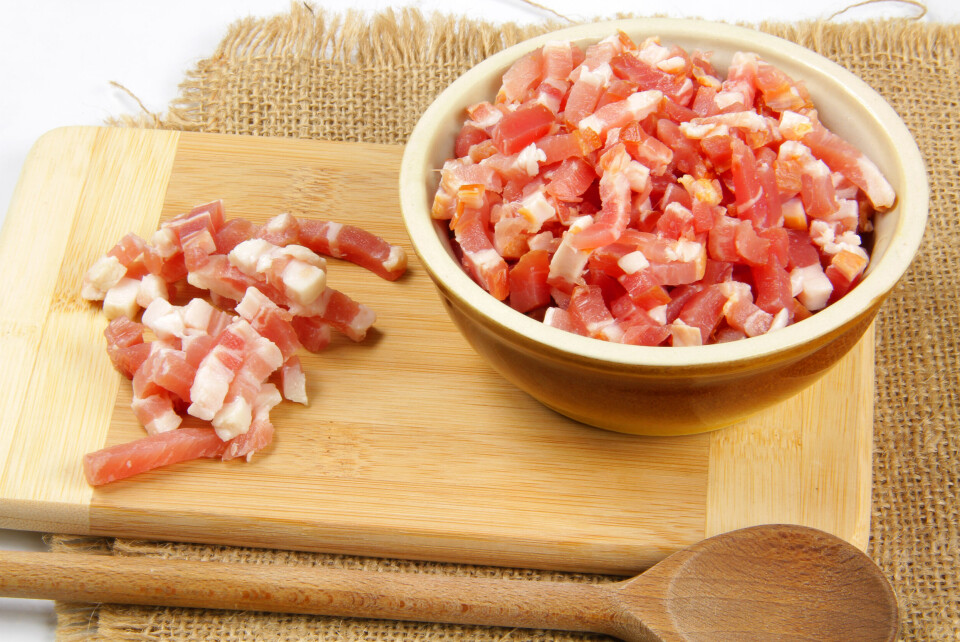-
E-cigarettes pose health risks, warns France’s health watchdog
The devices have “possible medium- and long-term” health effects, the warning says
-
Plans for new French youth worker contract that makes firing easier criticised
Union compared proposals to controversial ‘CPE’ contract plans that sparked major protests
-
Storm Pedro hits south-west France: trees uprooted and red flood alerts remain
Emergency plans activated in Bordeaux amid flood fears
Paris start-up creates 100% meat-free ‘lardon’ bacon
The product has a much lower carbon footprint than traditional meat, and comes as plant-based products gain in popularity in France

Bacon without meat? A new start-up in Paris has created just that, with a lardon-like product that is made entirely of plant-based soya, and has a much lower carbon footprint than traditional meat.
Made in Vendée (Pays de la Loire), the “meat” contains no animal proteins at all, but offers a flavour and texture similar to its meat-based counterpart. It can be used in a similar way too, including for frying and cooking in sauces.
Its carbon footprint is seven times smaller than that of a traditional bacon product.
The company, La Vie Foods, has managed to raise €25million in funding, and has received positive support from high-profile names including US actor Natalie Portman who is vegan.
The company is eventually aiming to expand and sell its products across Europe.
Co-founder Nicolas Schweitzer, told France3: “Global warming is clearly a key concern, as meat accounts for 18% of our carbon emissions. That's more than all the emissions from all transport combined.”
He added that the company’s mission comes with “a real awareness that we are going to have to change our eating habits [to beat climate change]”.
Are meat replacements gaining ground in France?
Though still relatively uncommon in France, meat replacement products are becoming more popular due to their image as being better for the planet and for animals.
Pierre-Emmanuel Vasseur, director of the Carrefour Grand Maine supermarket in Angers, said: “These products haven’t stopped growing [in popularity] over the past few years. We now have almost 200, and that is in response to demand among some of our clients.”
A poll from 2020 found that the majority of people in France want to reduce the environmental impact of their food.
Almost two thirds (60%) said they would be prepared to reduce their meat consumption. A similar number (57%) said that they would be prepared to eat less meat, to allow them to eat more organic produce.
While just 4% of respondents said they were totally vegetarian, a significant 68% said that they do not eat meat everyday, and more than a third (37%) said they do not eat dairy products everyday.
Read more:Poll: French happy to cut meat intake but not dairy
Similarly, school canteens across the country have been working to reduce meat consumption, with at least one meat-free daily menu per week introduced in 2019.
A recent study of the vegan and vegetarian food market in France found that sales of meat substitutes in supermarkets grew 11% in 2019, the latest figures available.
The report, carried out by market analysis company Xerfi, said that “from Danone to Nestlé, all the major manufacturers have invested in this promising market”.
Barbara Boyer, spokeswoman for animal rights group L214 Éthique et Animaux, said that “little by little, there are more vegan products being offered in France”.
“We can see that today the variety of vegetarian and vegan products in supermarkets and at restaurants is developing quickly,” she said.
“Many supermarkets, like Casino, Monoprix, Picard and Aldi, are launching their own range of vegan products so there are more alternatives. It’s true that we are trailing behind English-speaking countries like the UK, but over the past few years we have seen a real evolution in France in terms of vegan offers at restaurants and shops. It’s coming slowly.”
Read more:More vegan and vegetarian food now in stores in France
Are meat replacement products healthy?
It depends on the product itself of course, but a nutritionist who looked at the La Vie Foods “lardon” said it looked positive.
Marie Canard, who specialises in high-performance sport nutrition, said: “I mainly look at the composition as that is what’s important when buying plant-based products. You have to look at the label.
“I can see that this is quite low in calories and has a good amount of protein. That is important when trying to imitate animal protein but everything processed should be consumed in moderation.”
Are the products being used in restaurants too?
In Angers, one restaurant has started selling vegetable “bacon”, with owner Priscilla Reignier saying: “So far, clients like it, but it’s really new. It will take time [for people to get used to it].”
Many clients are starting to become more aware of the climate and animal impact of their food, and are becoming more open to the products.
One high school student said: “It might become a good habit. In the next few years, we might not have enough meat. So I think that in the future it will become a habit and everyone will need to reduce their meat consumption.”
Mr Schweitzer said that La Vie Foods is working with restaurateurs. He said: “We have chefs who are helping us to create recipes for restaurateur clients who want to incorporate our products on their menus.”
The soya “bacon” will soon appear on a Michelin-starred restaurant menu, he added.
Related articles
More vegan and vegetarian food now in stores in France
























